Fairness First Blog
Researchers’ voices in health equity
The Fairness First blog represents a space where researchers share with the broader community why health equity research matters to them, how do they connect to health equity, and what is the value of community engagement in the research process.
December 19, 2024
Reflections on Health Equity: Looking Back to Look Ahead
A discussion with SHERC’s Samantha Sabo
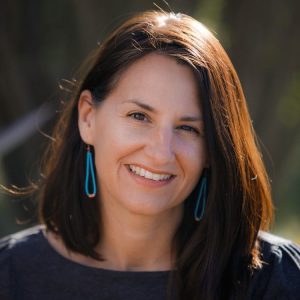 For this month’s post, Dr. Samantha Sabo takes a bird’s eye view and reflects on her experiences in health equity as a public health professional/researcher and shares how she plans to leverage her professional ethics as health-related policies change with the incoming presidential administration.
For this month’s post, Dr. Samantha Sabo takes a bird’s eye view and reflects on her experiences in health equity as a public health professional/researcher and shares how she plans to leverage her professional ethics as health-related policies change with the incoming presidential administration.
In addition to leading SHERC’s Community Engagement Core, Sam is a Professor of Public Health in the Department of Health Sciences and the Associate Director for Engagement and Policy with the Center for Community Health and Engaged Research (CHER).
Getting to Know Sam
Building a Career in Health Equity
I am a first-generation college student and grew up in the San Joaquin Valley of California which is a region of incredible agricultural productivity. It is also a region of diverse migration and immigration for largely Mexican farmworkers who serve as the backbone of the agricultural economy of California and the US. How and where I grew up were foundational in my commitment to health equity and why I’ve chosen to work with and for people who may not always have a direct pathway to social or political power where decisions are made about their health and lives.
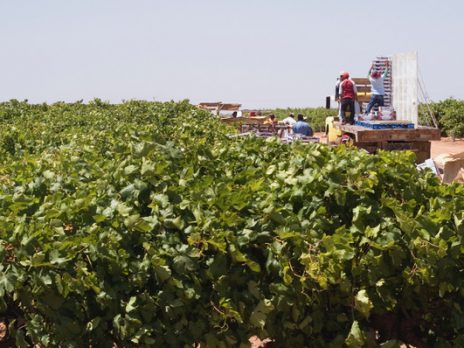
Looking back, my first introduction to public health was working as a bagger in my local grocery store in high school. I always loved language and started taking Spanish classes when I was in seventh grade. As a grocery bagger I was often asked to translate for Spanish speaking families coming into the grocery store who I learned were employed in agriculture. This experience led to building relationships with families in the community. I would take the groceries out to people’s cars and then we would get into bigger conversations about education and resources around health. It was these parking lot conversations with farmworkers that really shaped who I was and what I wanted to do with my life.
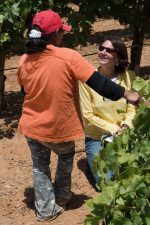 I continued working with farmworkers and their families in college and learned more about public health issues affecting immigrant families. After college, I had the privilege to serve as a Peace Corps volunteer in Guatemala. Here I worked with Indigenous agricultural laborers who were moving around Central America with sugar, banana, and coffee production – all the things we enjoy every day as American people. My experience in the Peace Corps led me to the University of Arizona and the US-Mexico border region where I served as a John D Coverdale Returned Peace Corps Fellow. As a fellow, I was able to work in service to local community organizations while I got my Master of Public Health degree. I’ve been working in public health and health equity ever since.
I continued working with farmworkers and their families in college and learned more about public health issues affecting immigrant families. After college, I had the privilege to serve as a Peace Corps volunteer in Guatemala. Here I worked with Indigenous agricultural laborers who were moving around Central America with sugar, banana, and coffee production – all the things we enjoy every day as American people. My experience in the Peace Corps led me to the University of Arizona and the US-Mexico border region where I served as a John D Coverdale Returned Peace Corps Fellow. As a fellow, I was able to work in service to local community organizations while I got my Master of Public Health degree. I’ve been working in public health and health equity ever since.
Public Health as Policy
The Role of Research in Health Equity
For me, research in health equity is about collaborating with individuals who are directly affected by societal challenges to generate evidence that informs policy and systems change. Research can be a tool for social change, capable of addressing historical inequities in education, wealth, and healthcare. For farmworkers and other precarious workers, research paired with action can improve health and safety conditions. I focus on working with people who know their circumstances best to co-create evidence-based practices and policies that enhance the health and living conditions of all.
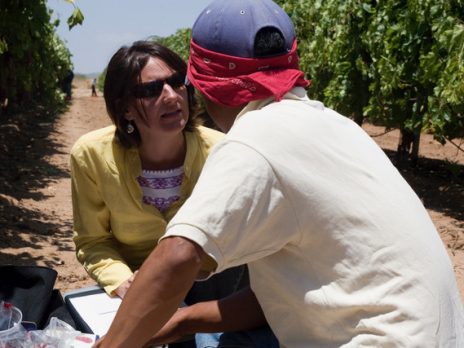 In my work, I collaborate with affected individuals, community organizations, and other stakeholders to translate evidence into actionable policy changes. For the past 20 years, I have worked with community health workers (CHWs) – trusted individuals with lived experience in the communities they serve. CHWs create vital connections between people and systems. My research aims to better understand and sustain this essential workforce, ensuring they can meet the needs of marginalized populations. Through partnerships with organizations, we have successfully created a pathway for CHWs to be certified by the state of Arizona and reimbursed for their services by Arizona Medicaid.
In my work, I collaborate with affected individuals, community organizations, and other stakeholders to translate evidence into actionable policy changes. For the past 20 years, I have worked with community health workers (CHWs) – trusted individuals with lived experience in the communities they serve. CHWs create vital connections between people and systems. My research aims to better understand and sustain this essential workforce, ensuring they can meet the needs of marginalized populations. Through partnerships with organizations, we have successfully created a pathway for CHWs to be certified by the state of Arizona and reimbursed for their services by Arizona Medicaid.
For me, public health is about policy. I’m not in the business of telling anyone what to do with their life, but I enjoy working with people to determine how we can structure our society to make healthy choices the easy choices and ensure safe living and working conditions for everyone. I love thinking about policy and different approaches to improving population health.
The Coming Year: Critically Engaging with Public Health Values
Here, Sam reflects on the professional and ethical responsibilities of public health professionals.
Health Equity, Voting, and Public Health Values
There was a wonderful article, published by Health Affairs, before the presidential election this summer that addresses how voting is crucial to health equity. This article really helped me think about how voting informs policies that are relevant to the health of people who live in this country. Voting is a public health priority because public health is inherently political. Ultimately, you can have good policies that protect your health and you can have bad policies that hurt your health. As a public health professional, I care about health equity and I care about laws, policies, and decision makers that uphold the values of my profession and support good health. In many ways, this is a critical time for us, as a profession, to truly engage with our ethics and values.
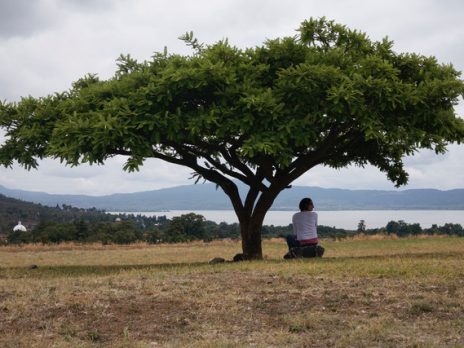 Many public health practitioners belong to the American Public Health Association (APHA). The APHA’s code of ethics includes a set of core ethical values: Professionalism and Trust, Health and Safety, Health Justice and Equity, Interdependence and Solidarity, Human Rights and Civil Liberties, and Inclusivity and Engagement. Additionally, the APHA puts out a yearly list of priorities. Public health is the safety net, and we have an ethical and professional responsibility to work on behalf of – and with – all people. Public health professionals are trained to serve and work on behalf of the people in our communities and in our nation that fall through the safety net. As a profession, we will continue to uphold the professional values and ethics that guide our work, and address the issues and priorities put out by the APHA and those identified by the communities we serve.
Many public health practitioners belong to the American Public Health Association (APHA). The APHA’s code of ethics includes a set of core ethical values: Professionalism and Trust, Health and Safety, Health Justice and Equity, Interdependence and Solidarity, Human Rights and Civil Liberties, and Inclusivity and Engagement. Additionally, the APHA puts out a yearly list of priorities. Public health is the safety net, and we have an ethical and professional responsibility to work on behalf of – and with – all people. Public health professionals are trained to serve and work on behalf of the people in our communities and in our nation that fall through the safety net. As a profession, we will continue to uphold the professional values and ethics that guide our work, and address the issues and priorities put out by the APHA and those identified by the communities we serve.
Leaning into Community Collaborations
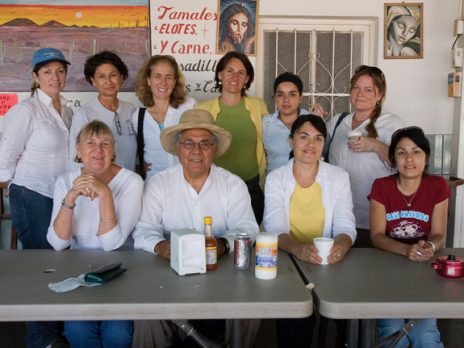 NAU, CHER, and SHERC offer really unique environments for engaging with communities. As an institution, we are collaborative and highly value working with communities and being led by the priorities of our partners. The populations that are affected by health disparities are the experts and the institutional culture of NAU allows researchers like me to be in service to community partners. Communities as full partners is the model for public health and I find that NAU values its teacher-scholars taking the time to establish equitable partnerships with communities, organizations, and leaders, because we can only move at the pace of trust.
NAU, CHER, and SHERC offer really unique environments for engaging with communities. As an institution, we are collaborative and highly value working with communities and being led by the priorities of our partners. The populations that are affected by health disparities are the experts and the institutional culture of NAU allows researchers like me to be in service to community partners. Communities as full partners is the model for public health and I find that NAU values its teacher-scholars taking the time to establish equitable partnerships with communities, organizations, and leaders, because we can only move at the pace of trust.
A Call to Action
There are many ways to get involved in public health and health equity. I really believe that public health professionals have a superpower of making sure those who don’t have a seat at the table get one and their voice is listened to and acted upon. Local action on health equity can be incredibly powerful and has the potential for more immediate impact. In Arizona, consider connecting with the Arizona Public Health Association. Large-scale action is also important. Anyone can meet with their congress people and attend public forums. The APHA’s Speak for Health initiative is a great place to go for information about health advocacy and ideas to make your voice heard. Find something you care about and get involved!